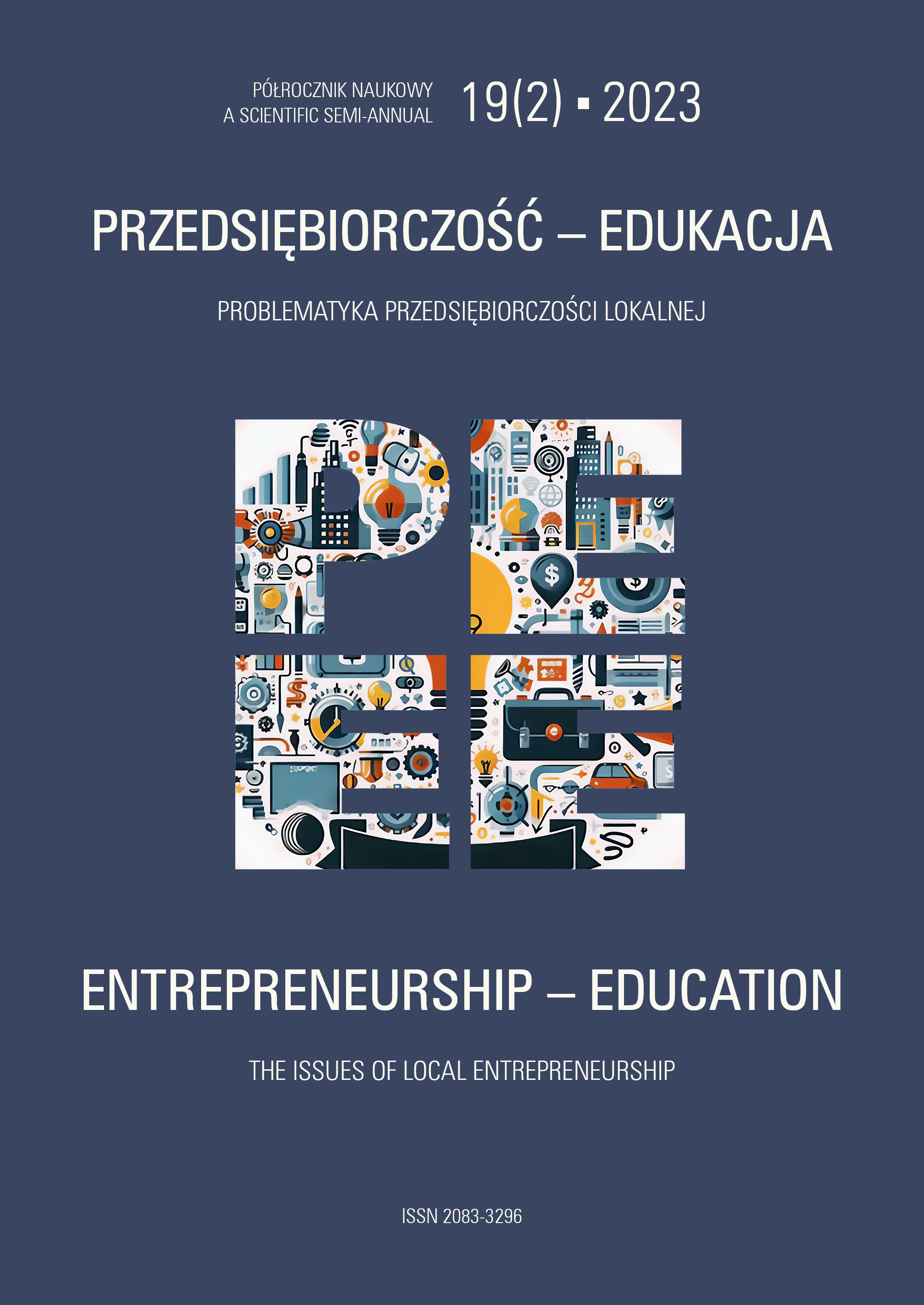Wpływ funduszy europejskich na rozwój przedsiębiorczości – rola Małopolskiego Centrum Przedsiębiorczości w wykorzystaniu funduszy europejskich w województwie małopolskim
DOI:
https://doi.org/10.24917/20833296.192.5Słowa kluczowe:
; przedsiębiorczość, fundusze europejskie, Małopolska, rozwój regionalny, JSTAbstrakt
Artykuł opisuje rolę Małopolskiego Centrum Przedsiębiorczości (MCP) w wykorzystywaniu funduszy unijnych w województwie małopolskim, na podstawie dwóch programów operacyjnych: Małopolskiego Regionalnego Programu Operacyjnego (MRPO) na lata 2007–2013 i Regionalnego Programu Operacyjnego Województwa Małopolskiego (RPO WM) na lata 2014–2020. W pierwszych latach swojej działalności MCP wdrażało część MRPO, wspierając inwestycje i innowacje mikro-, małych i średnich przedsiębiorstw (MŚP). W latach 2008–2015 ogłoszono łącznie 27 konkursów, w których wsparcie finansowe przekazane beneficjentom wyniosło 697 mln zł, dzięki czemu zostało utworzonych 3,5 tys. miejsc pracy i wprowadzono 2,6 tys. innowacji. Kolejny program – RPO WM – dotyczył dalszego rozwoju małopolskiej gospodarki przez wspieranie inwestycji oraz innowacji w kluczowych dla rozwoju regionalnego obszarach. Małopolskie Centrum Przedsiębiorczości przeprowadziło łącznie 108 naborów i przyznało w imieniu Zarządu Województwa 6 mld zł wsparcia, co pozwoliło na stworzenie nowych miejsc pracy, rozwijanie firm, dywersyfikację działalności gospodarczej, wsparcie innowacyjności i promowanie eksportu. Odpowiedzią województwa małopolskiego na skutki pandemii COVID-19 było uruchomienie programu Małopolska Tarcza Antykryzysowa, którego głównym celem było wspieranie MŚP w zachowaniu płynności finansowej i utrzymaniu miejsc pracy. Małopolskie Centrum Przedsiębiorczości wsparło w tym czasie ponad 8 tys. firm kwotą ponad 280 mln zł, co pozwoliło na utrzymanie ponad 30 tys. miejsc pracy. Artykuł podkreśla synergiczną rolę funduszy UE i instytucji publicznych w kształtowaniu lepszych warunków dla rozwoju przedsiębiorczości. W artykule zastosowano zintegrowaną metodologię, która łączy w sobie podejście studium przypadku dotyczącego Małopolskiego Centrum Przedsiębiorczości z analizą danych statystycznych.
Bibliografia
Dvouletý, O., Srhoj, S., Pantea, S. (2021). Public SME grants and firm performance in European Union: A systematic review of empirical evidence. Small Business Economics, 57, 243–263.
Jankiewicz, S. (2004). Wspieranie rozwoju małych i średnich przedsiębiorstw, jako priorytet polityki gospodarczej. Poznań: Wydawnictwo Akademii Ekonomicznej w Poznaniu.
Komor, A. (2016). Wybrane uwarunkowania strukturalne decyzji lokalizacyjnych małych i średnich przedsiębiorstw. Polityka Ekonomiczna, 450, 298–300.
Łęczycka, B. (2020). Bariery i szanse rozwoju sektora MŚP w województwie małopolskim. Studia Ekonomiczne. Gospodarka, Społeczeństwo, Środowisko, 5, 128–145.
Małopolska Tarcza Antykryzysowa. (2023, 10 sierpnia). Pozyskano z: https://www.malopolska.pl/dobrojestwmalopolscestopkoronawirusowi/malopolska -tarcza -antykryzysowa
Małopolski Regionalny Program Operacyjny na lata 2007–2013. (2023, 10 sierpnia). Pozyskano z: https:// www.rpo.malopolska.pl/download/MRPO/MRPO_6122016.pdf
Piątkowski, M.J., Urbaniec, M. (2023). Ekosystem przedsiębiorczości. Uwarunkowania i źródła finansowania. Warszawa: Difin.
Regionalny Program Operacyjny Województwa Małopolskiego na lata 2014–2020. (2023, 10 sierpnia). Pozyskano z: https://www.rpo.malopolska.pl/download/program -regionalny/o -programie/zapoznaj -sie -z -prawem -i -dokumentami/regionalny -program -operacyjny-2014-2020/2023/08/RPO_WM_20142020_03082023.pdf
Regionalna Strategia Innowacji Województwa Małopolskiego 2020. (2023, 10 sierpnia). Pozyskano z: https://www.malopolska.pl/biznes/innowacje/regionalna -strategia -innowacji
Sabal, M. (2019). Mezootoczenie jako czynnik rozwoju firm rodzinnych w Małopolsce. W: Zarządzanie przedsiębiorstwem: teoria i praktyka: XIX międzynarodowa konferencja naukowa: 1–2 lipca 2019, N. Iwaszczuk, P. Łebkowski. Kraków – Racławice: Wydawnictwo IGSMiE PAN, 91–106.
Skica, T., Rodzinka, J. (2020). Instrumentalizacja wsparcia przedsiębiorczości w Polsce Estonii i na Słowacji. Samorząd terytorialny, administracja centralna oraz instytucje publiczne. Rzeszów – Londyn – Szczecin: Wydawnictwo Naukowe IVG.
Sprawozdanie końcowe z realizacji Małopolskiego Regionalnego Programu Operacyjnego na lata 2007– 2013 (MRPO), Załącznik do Uchwały Nr 1/17 KM MRPO w latach 2007–2013 z dnia 23 marca 2017 roku. (2023, 10 sierpnia). Pozyskano z: https://bip.malopolska.pl/e,pobierz.html?id=1351726
Spychała, J., Spychała, M. (2021). Significance of the EU funds in regional development on the example of NUTS-3 units in Poland. Research Papers in Economics and Finance, 5(1), 22–37.
Stevenson, H.H., Jarillo, J.C. (1990). A Paradigm of Entrepreneurship: Entrepreneurial Management. Strategic Management Journal, 11, 17–27.
Wach, K. (2015). Przedsiębiorczość, jako czynnik rozwoju społeczno- gospodarczego: przegląd literatury. Przedsiębiorczość – Edukacja [Entrepreneurship – Education], 11, 24–36.
Walczak, D., Żołądkiewicz, A. (2015). Wybrane determinanty rozwoju przedsiębiorczości w Polsce. Roczniki Naukowe Stowarzyszenia Ekonomistów Rolnictwa i Agrobiznesu, 17, 398–402.
Wytyczne w zakresie monitorowania postępu rzeczowego realizacji programów operacyjnych na lata 2014–2020. (2023, 10 sierpnia). Pozyskano z: https: //www.funduszeeuropejskie.gov.pl/strony/o- -funduszach/dokumenty/wytyczne -w -zakresie -monitorowania -postepu -rzeczowego -realizacji-programow -operacyjnych -na -lata-2014-2020/.
Żero, S. (2019). Wpływ instytucji lokalnych na kształtowanie się przedsiębiorczości. W: II Konferencja Naukowa „Współczesne problemy ekonomiczne w badaniach młodych naukowców”, 24 maja 2018. Białystok: Polskie Towarzystwo Ekonomiczne. http://dx.doi.org/10.15290/wpewbmn3.2019.09
Pobrania
Opublikowane
Jak cytować
Numer
Dział
Licencja
Prawa autorskie (c) 2023 Przedsiębiorczość - Edukacja

Utwór dostępny jest na licencji Creative Commons Uznanie autorstwa – Bez utworów zależnych 4.0 Międzynarodowe.
Artykuły publikowane są zgodnie z warunkami licencji Creative Commons (CC BY-ND 4.0; uznanie autorstwa-bez utworów zależnych).

